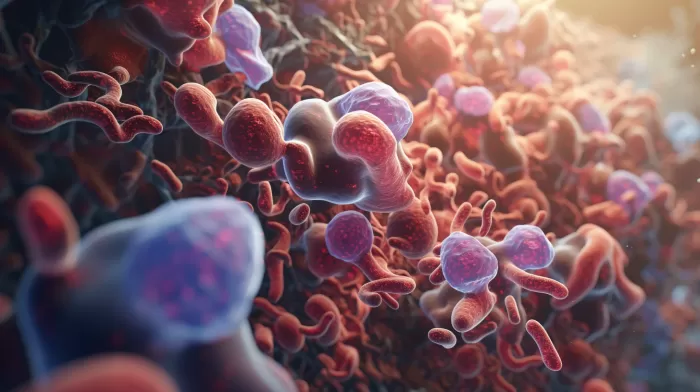Probiotics aren’t just beneficial for digestion; they’re also crucial players in preventing serious intestinal issues, such as inflammatory bowel disease and colon cancer. In a recent study, scientists at the University Lille Nord de France in Lille, France, discovered that probiotic bacteria stimulate the release of cancer-fighting proteins from the intestines’ lining cells, offering powerful protection against disease.
Probiotics and Inflammation
In these lab tests, fecal transplants were performed, transferring fecal matter from healthy intestines to inflamed intestines. These procedures demonstrated that probiotics could restore intestinal health and protect against inflammatory conditions and tumor growth.
So how do they work? One way that these powerful probiotics defend against pathogens is by producing anti-inflammatory substances such as short-chain fatty acids. These molecules can penetrate the cells lining the intestines and activate various pathways that help regulate inflammation. In turn, these effects could help reduce the likelihood of developing inflammatory bowel disease and other inflammatory conditions.
Additionally, probiotics can help maintain the integrity of the gut lining, which is essential for preventing pathogenic bacteria from crossing over and wreaking havoc on intestinal tissue. By strengthening the gut lining, probiotics can keep harmful bacteria at bay and promote a healthier intestinal environment for the body.
How to Support Your Gut Health
Understanding the critical role that probiotics play in maintaining gut and overall health, you may wonder how to keep these friendly bacteria thriving in your intestinal tract. Here are a few tips to support a flourishing gut microbiome:
Consuming a Diet Rich in Fiber and Nutrients
Fibrous and nutrient-dense foods such as fruits, vegetables, and whole grains are great sources of the prebiotic fiber that probiotics feed on, helping them grow and multiply. To ensure a good balance of beneficial bacteria in your intestines, aim for at least 25 grams of fiber per day for women and 38 grams for men from a variety of sources.
Incorporating Fermented Foods
Fermented foods like yogurt, kefir, sauerkraut, kimchi, and kombucha are packed with beneficial probiotics. Regularly consuming these foods can replenish and maintain your gut microbiota, promoting overall health and well-being.
Steer Clear of Overusing Antibiotics
Antibiotics kill off harmful bacteria but can also affect the beneficial ones. Overuse can, in turn, disrupt the gut microbiota, leading to potential gastrointestinal problems. Avoid taking antibiotics unnecessarily and follow your healthcare provider’s advice closely when using them.
Manage Stress and Get Adequate Sleep
Believe it or not, stress and suboptimal sleep patterns can impact your gut health, as they alter the composition of the gut bacteria in unfavorable ways. Aim to manage stress through practices such as mindfulness and meditation and establish a healthy sleep routine to support a thriving gut microbiome.
Consider Taking a Probiotic Supplement
If you are still concerned about your gut health or if certain circumstances may compromise it temporarily, taking a high-quality probiotic supplement can be a viable option. Look for multi-strain probiotics containing at least 1 to 10 billion colony-forming units (CFUs) per dose. Consult your healthcare professional for guidance on the most suitable probiotic for your needs.
Conclusion
As more research on the importance of gut health and its connection to overall well-being comes to light, it’s crucial to understand how to support these friendly bacteria and help them thrive. By taking the proper steps and making health-conscious choices, you can foster a healthy gut environment, ward off inflammation, and reduce the risk of serious intestinal diseases such as cancer. With a robust and balanced gut microbiome, your body will be better equipped to maintain optimal health and vitality long-term.



